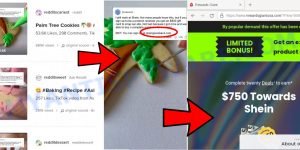In the vast digital landscape, scams and phishing attempts have become increasingly prevalent, targeting unsuspecting individuals with enticing offers and fraudulent schemes. One such scam that has gained attention recently is the Kohl’s Ninja Knife Set scam, which arrives in the form of an email claiming that recipients have been chosen to participate in a loyalty program and can win a brand new Ninja NeverDull Premium Knife Set. This deceptive email, commonly known as the ‘Answer and Win’ email, preys on people’s curiosity and desire for rewards, enticing them to engage further. However, behind this seemingly exciting opportunity lies a deceitful trap designed to trick and exploit recipients.
In this article, we will delve into the details of this scam, shedding light on its fraudulent tactics and providing insights to help you stay protected. Whether you have received the ‘Answer and Win’ email, searched for information about the scam, or want to safeguard yourself from falling victim to similar schemes, read on to uncover the truth and learn how to defend yourself against the Kohl’s Ninja Knife Set scam.
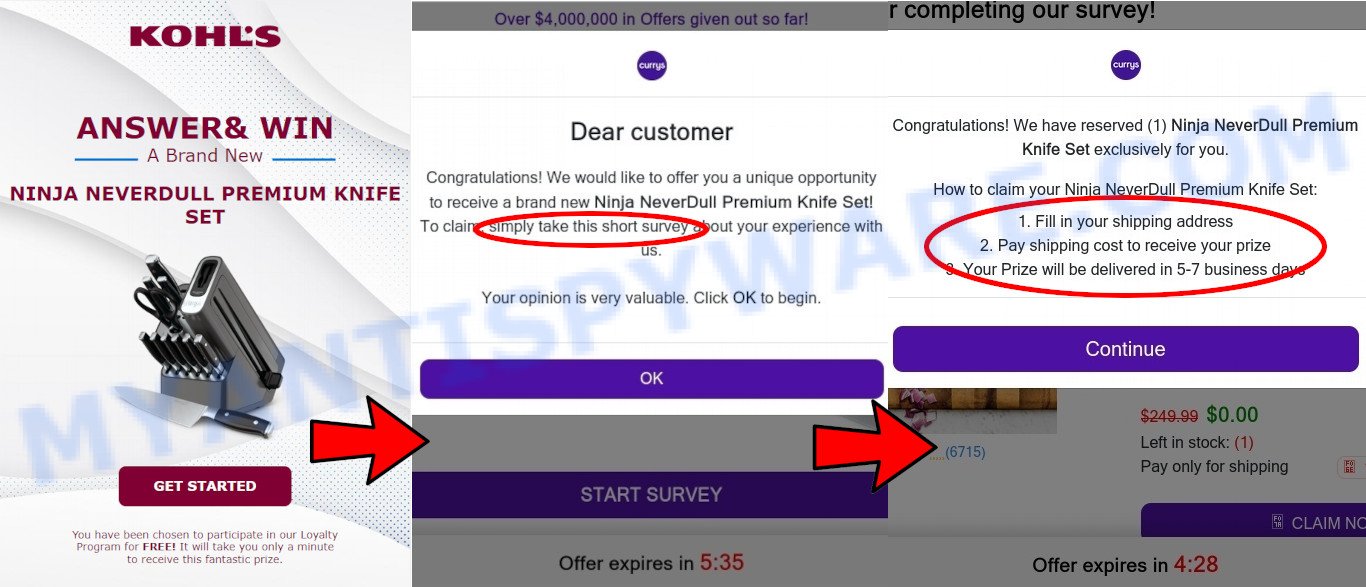
QUICK LINKS
- What is Kohl’s Ninja Knife Set Scam and How it works
- What to do if you receive the email
- How to Spot a Survey Scam?
What is Kohl’s Ninja Knife Set Scam and How it works
The Kohl’s Ninja Knife Set scam is a deceptive scheme that tricks individuals into divulging personal information or falling victim to fraudulent activities. It begins with an email, often labeled as an “Answer and Win” email, which falsely claims that the recipient has been selected for a loyalty program and stands a chance to win a Ninja NeverDull Premium Knife Set.
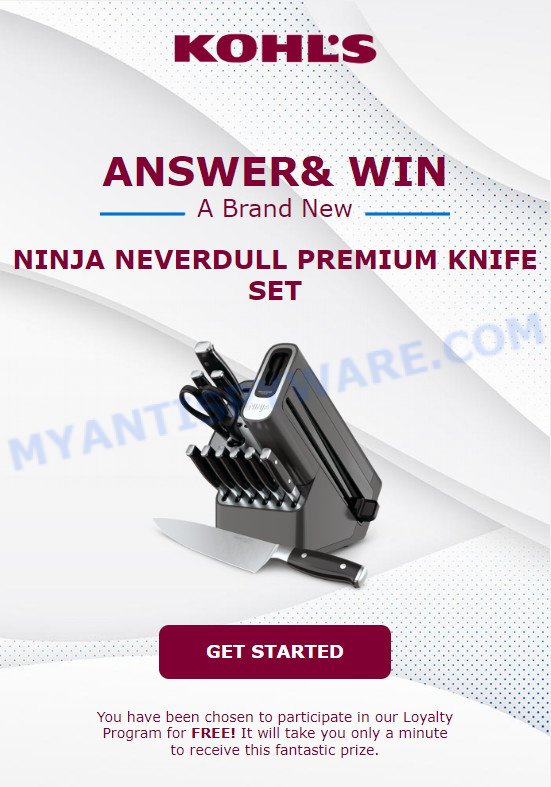
Using the Kohl’s logo or branding to appear legitimate, the email prompts recipients to click on a link to claim their prize. This link leads them to a counterfeit website designed to mimic a genuine survey or feedback page. The website employs language and design elements reminiscent of reputable companies, further deceiving victims.
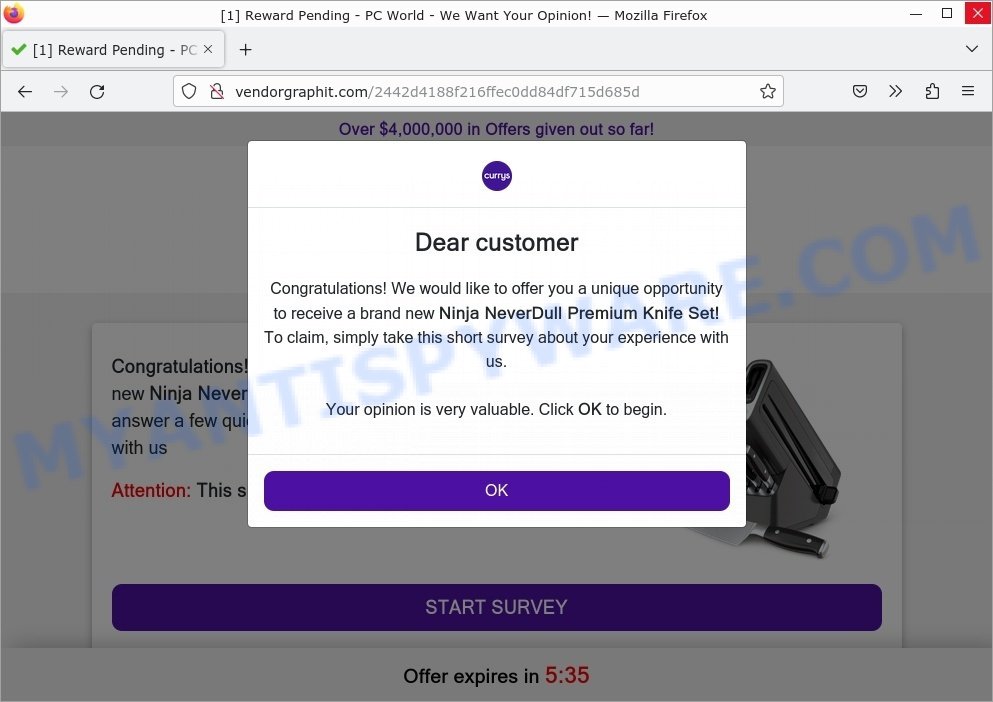
Once on the fraudulent website, recipients are instructed to complete a short survey about their experience with the company. The survey serves as a ploy to collect personal information such as names, addresses, phone numbers, and even financial details, under the guise of confirming eligibility for the prize. Psychological tactics, such as creating a sense of urgency or limited-time offers, are often used to pressure victims into sharing their information hastily.
Upon completing the survey, victims are informed that they have qualified for the Ninja NeverDull Premium Knife Set, listed as being available for free, with only shipping costs to be paid. However, this is yet another ruse, as the scammers are primarily after the payment information provided for shipping purposes.
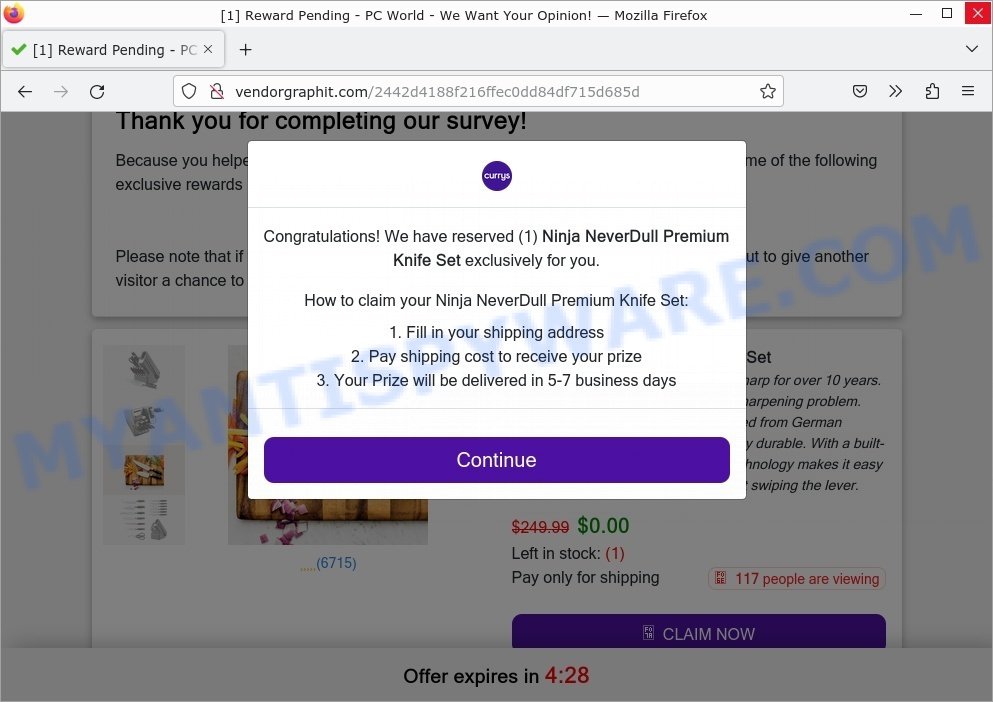
In reality, victims rarely receive the promised knife set, or if they do, it is typically a subpar or counterfeit product. Meanwhile, the scammers gain access to the personal and financial information provided, which can be used for identity theft, further scams, or sold on the dark web.
Here is a step-by-step breakdown of how the Kohl’s Ninja Knife Set scam works:
- The scam begins with an unsolicited email, often titled as an “Answer and Win” email, sent to potential victims. The email claims that the recipient has been selected to participate in a loyalty program and has the opportunity to win a Ninja NeverDull Premium Knife Set from Kohl’s.
- The email may feature the Kohl’s logo or branding to create an illusion of legitimacy. This visual association with a well-known retailer aims to convince recipients that the offer is genuine.
- The email entices recipients with the promise of winning a high-value item, the Ninja NeverDull Premium Knife Set. This offer is designed to grab the attention and interest of potential victims.
- Upon opening the email, recipients are encouraged to click on a provided link to participate or claim their prize. This link directs them to a counterfeit website specifically created for the scam.
- The website, designed to mimic a legitimate survey or feedback page, has a similar appearance to the official Kohl’s website. This deceptive layout is intended to deceive victims and make the scam appear more credible.
- Once on the fraudulent website, victims are instructed to complete a short survey about their experience with the company. The questions are carefully crafted to extract personal information from the victims, such as their name, address, phone number, and even financial details.
- After completing the survey, victims may receive a message stating that they have qualified to receive the Ninja NeverDull Premium Knife Set. The scammers use this message to create a false sense of accomplishment and validate the legitimacy of the scam.
- Victims are then informed that the knife set is offered for free, with only the shipping cost to be paid. They are prompted to provide their payment information, including credit card details, to cover the shipping charges.
- In most cases, victims either never receive the promised knife set, or if they do, it is of poor quality or a counterfeit product. The scammers have already obtained the victims’ payment information and have no intention of delivering a legitimate item.
- The personal and financial information provided by victims during the survey and payment process can be exploited for identity theft, further fraudulent activities, or sold on the dark web.
It is essential to be vigilant and skeptical when encountering such emails, particularly when they claim to offer valuable prizes or rewards. Always exercise caution and verify the legitimacy of offers directly through official channels to avoid falling victim to scams like the Kohl’s Ninja Knife Set scam.
Examples of such scams
Scam emails come in various forms, targeting unsuspecting individuals with enticing offers and false promises. The Kohl’s Ninja Knife Set scam is just one example of these deceptive schemes. However, it’s important to recognize that this is not an isolated incident. Similar scams have emerged under different guises, all aimed at luring victims into divulging personal information or falling victim to financial fraud.
These scams can be found on websites, pop-up ads, or social media platforms. Shein Gives Back Product Reviewer Scam, Amazon Giveaway Scam, May Cash 2023, and Mr Beast Giveaway Scam are some of the scams we reported recently. By familiarizing ourselves with these scams, we can better protect ourselves from falling into their traps.
These examples highlight the diverse tactics employed by scammers in their attempts to deceive innocent individuals. By staying informed about the methods they use, we can become more vigilant and better equipped to identify and avoid such scams.
- Amazon Product Tester Scam
- Shein Gives Back Scam
- Amazon Mother Day Giveaway Scam
- Mr Beast Giveaway Scam YouTube ad
- SHEIN Gift Card Instagram Scam
What to do if you receive the email
If you receive the Kohl’s Ninja Knife Set scam email or any suspicious email, the most important thing to remember is: do not click on any links or download any attachments. Clicking on malicious links can lead to malware infections or direct you to fraudulent websites designed to steal your personal information. If you have already clicked on a link, immediately disconnect from the internet and run a thorough antivirus scan on your device to detect and remove any potential malware.
Here are additional steps to take if you receive the email:
- Mark the email as spam. Use the spam or junk mail options in your email client to mark the email as spam. This helps train the email filters to recognize similar scam emails in the future.
- Once you have reported the email, delete it from your inbox and trash folder. Keeping the email increases the risk of accidentally clicking on a malicious link or falling prey to the scam at a later time.
- Never share sensitive personal information, such as your Social Security number, bank account details, or credit card information, in response to unsolicited emails. Legitimate companies would not ask for such information via email.
- Stay informed about common email scams and phishing techniques. Regularly educate yourself about the latest scams and tactics used by cybercriminals. This knowledge will help you identify and avoid potential threats in the future.
- Ensure your computer has up-to-date antivirus and anti-malware software installed. Regularly update these programs to stay protected against evolving threats.
- Exercise caution when dealing with unsolicited emails. Scrutinize the email for any suspicious signs, such as spelling or grammar errors, generic greetings, or unexpected offers.
If you have already clicked on a link or provided personal information and suspect that you may have fallen victim to the scam, it is important to take immediate action. Contact your financial institution to report any unauthorized charges, monitor your accounts for suspicious activity, and consider placing a fraud alert or credit freeze on your credit reports. Use the steps (https://consumer.ftc.gov/articles/what-do-if-you-were-scammed) to try to stop a transaction, get a transaction reversed, or get a refund.
Remember, it’s always better to err on the side of caution when dealing with suspicious emails. When in doubt, trust your instincts and prioritize your online security.
Threat Summary
| Name | Kohl’s Ninja Knife Set scam, “Kohl’s Survey Ninja”, “Kohl’s Ninja Knife Set giveaway”, “Kohl’s Ninja Knife Set survey” |
| Type | Survey Scam, Phishing, Social Engineering |
| Scammers’ Websites | vendorgraphit.com |
| Fake Claims | Claims recipients have won a Ninja NeverDull Premium Knife Set through a loyalty program. |
| Disguise | Emails mimic official Kohl’s branding and use deceptive subject lines and email content. |
| Damage | Identity theft, financial loss, potential malware infection |
| Distribution | Mass emails, targeted spam campaigns |
| Indicators of the Scam | Unsolicited emails with subject lines mentioning Kohl’s, requests for personal/financial information, suspicious website URLs. |
| Prevention Tips | Be cautious of unsolicited emails; verify offers independently and never share personal or financial information without verification |
| Reporting Info | Report the scam email to your local authorities, the FTC at https://reportfraud.ftc.gov/, and the Anti-Phishing Working Group (APWG). |
How to Spot a Survey Scam?

Here are some red flags to help you spot a survey scam: offers that seem too good to be true, requests for personal information, pressure to act quickly, requests for payment, lack of clear information.
- If a prize or reward being offered is significantly more valuable than what you would normally expect from a survey, it may be a scam.
- Legitimate surveys will typically only ask for basic demographic information, such as your age and gender. If a survey is asking for sensitive information, such as your Social Security number, credit card information, or bank account details, it’s likely a scam.
- Scammers may use tactics such as urgency or limited-time offers to pressure you into providing personal information quickly.
- Suspicious website or email addresses: If the website or email address associated with the survey is not well-established or seems suspicious, it may be a scam.
- Legitimate surveys will never require payment to participate. If a survey is asking for payment, it’s likely a scam.
- If the terms and conditions of the survey are unclear, or if there is no clear explanation of how the information collected will be used, it may be a scam.
By being aware of these red flags and being cautious when providing personal information online, you can protect yourself from survey scams. If you suspect that a survey is a scam, it’s best to avoid it and to report it to the relevant authorities, such as the Federal Trade Commission (FTC) in the US.
Conclusion
The “Ninja NeverDull Premium Knife Set” email scam serves as a reminder that scams are prevalent in our digital world, and it’s crucial to remain vigilant and informed. Scammers continue to devise new tactics, using enticing offers and persuasive techniques to trick unsuspecting individuals into divulging personal information or falling victim to financial fraud. By understanding the red flags associated with these scams, such as unsolicited emails, requests for personal information, or offers that seem too good to be true, we can better protect ourselves.
Remember, if an offer seems too good to be true, it probably is. Stay informed, stay cautious, and stay safe in the digital landscape.

